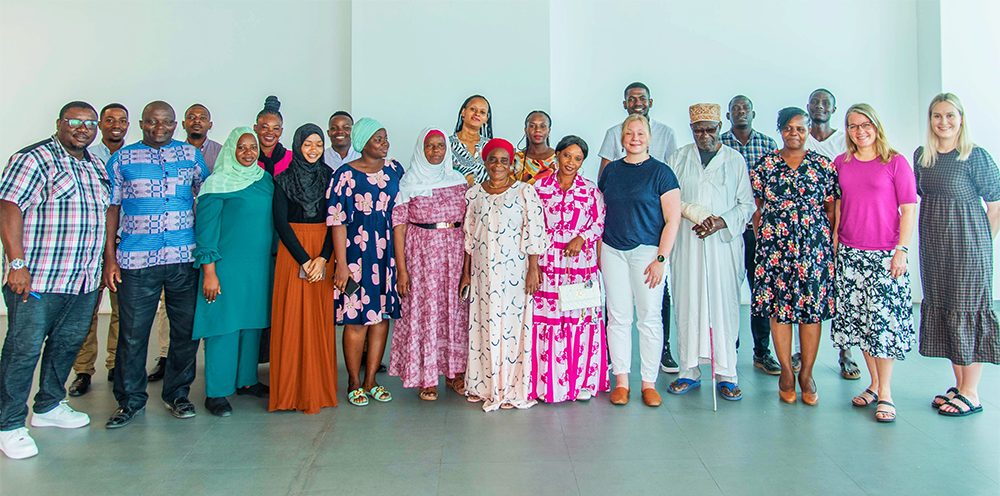KADI Dar es Salaam stakeholder workshop gathered together 25 participants from various backgrounds. The workshop day was not just full of dialogue, but also good food, laughter, team building activities, brief presentations, and new connections.
One of the KADI project aims is to co-design climate services for urban context in three African cities – Abidjan, Nairobi, and Dar es Salaam. The goal is to enhance resilience against climate stressors. In the Dar es Salaam city pilot, the focus is on designing climate service for citizens for coping with current and future impacts of heavy precipitation, extreme heat, and air pollution (Figure 1).
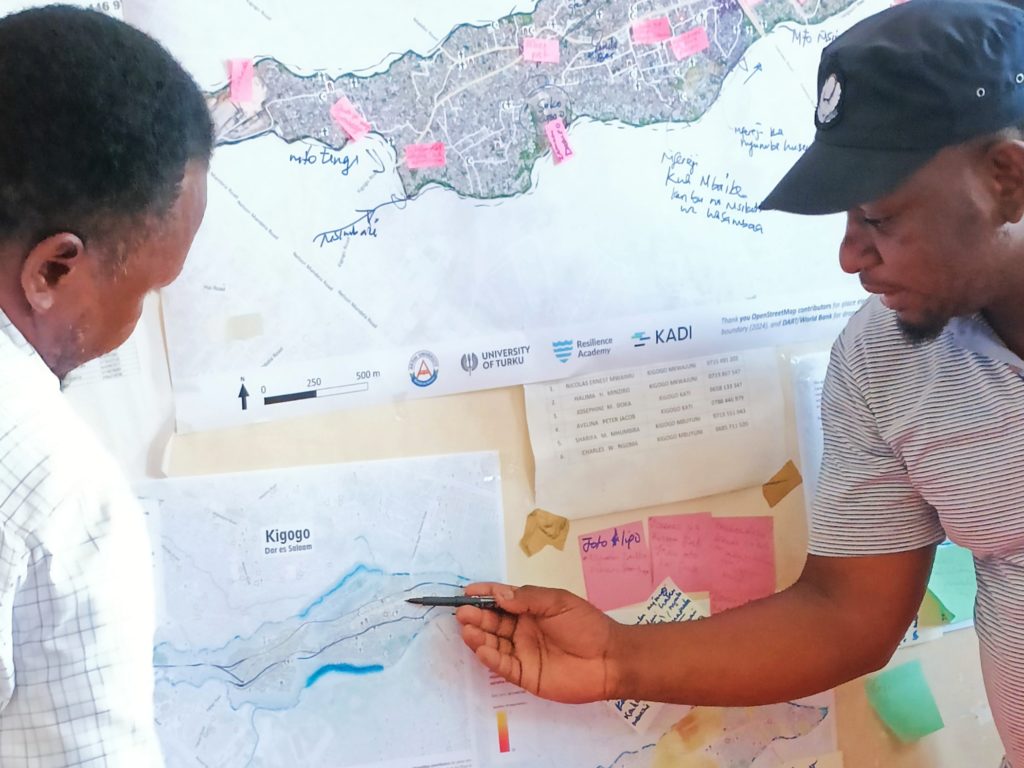
Led by the University of Turku (UTU), Finland and Ardhi University (ARU), Dar es Salaam, the climate service design has grounds on a community-based approaches to ensure the development of a climate service with genuine potential for sustainable uptake by citizens and other actors involved in climate-related activities within the city. The design builds on the existing Tanzanian Resilience Academy approach where students from local universities, together with community members, collect crucial data on climate stressors, their impacts, city’s vulnerabilities, the urban infrastructure, and the environment using low-cost mobile tools.
Community focus group discussion and participatory mapping
To address the true needs of the urban communities, initial activities of the pilot focused on engaging relevant actors – especially the citizens – to discuss concrete needs for climate action and access to climate information. Two focus group discussions were conducted on February 6th and 7th in Tandale and Kigogo wards, both frequently experiencing floods, extreme heat, and air pollution.
Prior these discussions a participatory mapping campaign was conducted in October 2023, revealing valuable information not previously recorded regarding the spatial occurrence of poor air quality, extreme heat, and floods, which were used as a basis for the focus group discussions. The participatory mapping campaign was conducted by ARU students who had previously attended Resilience Academy data collection activities.
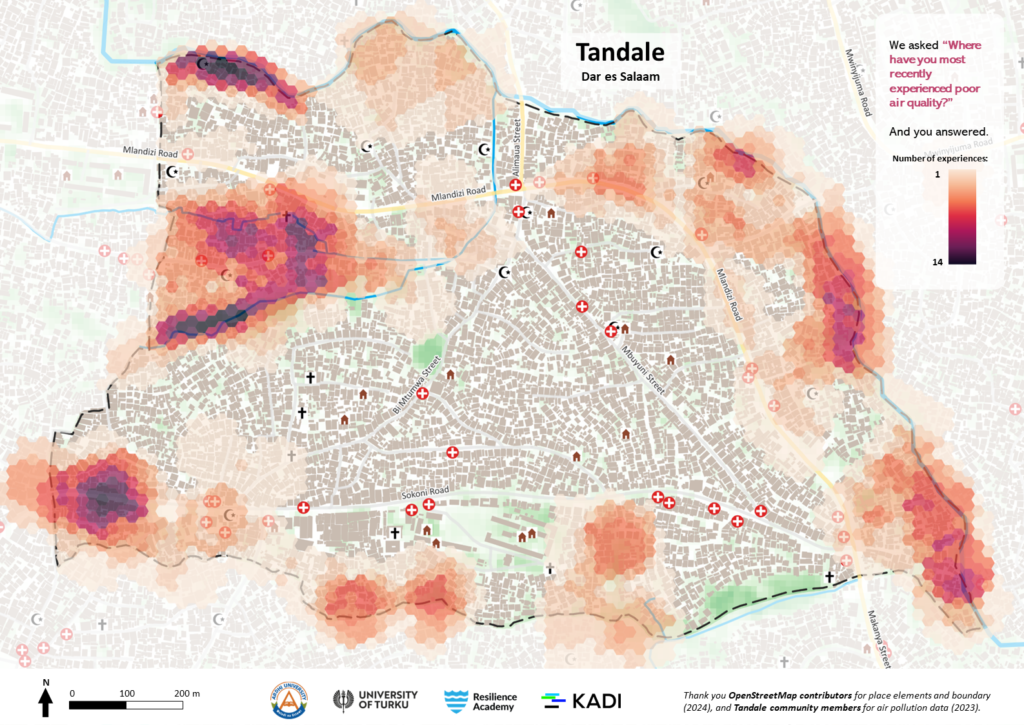
As it is evident that the climate itself – high temperatures or amount of precipitation – cannot be changed, the focus group discussions highlighted that the communities’ needs for adapting to and coping with climate stressors are tied to improved urban planning. Issues such as proper solid waste management to prevent drainage blockage and flooding emerged as crucial. Lack of proper waste management also leads to continuous burning of solid waste which is a constant source for air pollution and additional heat in the neighbourhoods. In addition to solid waste management, the communities emphasized the importance of overall better urban infrastructure, including improved drainage networks, liquid waste management, regulations on land building, flood barrier construction, and better management of the natural rivers flowing through the wards.
Most importantly, the discussions underscored the significance of transferring local knowledge to formats interoperable with existing and new climate data, and urban plans. The KADI Dar es Salaam city pilot concentrates on this very element where the vast local knowledge could be integrated in creating actionable climate services that combine climate information with contextual neighbourhood-level information for genuine and sustainable transformation.
Stakeholder workshop
The stakeholder workshop that followed the focus group discussions was held on February 9th and involved representatives from citizen communities, academia, the Tanzanian Meteorological Agency, ward-level environmental offices, and urban planners (Figure 3). The workshop delved deeper into concrete steps for meeting community needs, emphasizing collaborative efforts of the governmental offices and the local communities. Solving the urban planning challenges for improved climate resilience require a lot of human resources, time, money, political will, and data and information of the occurrence and impacts of climate stressors in the city.
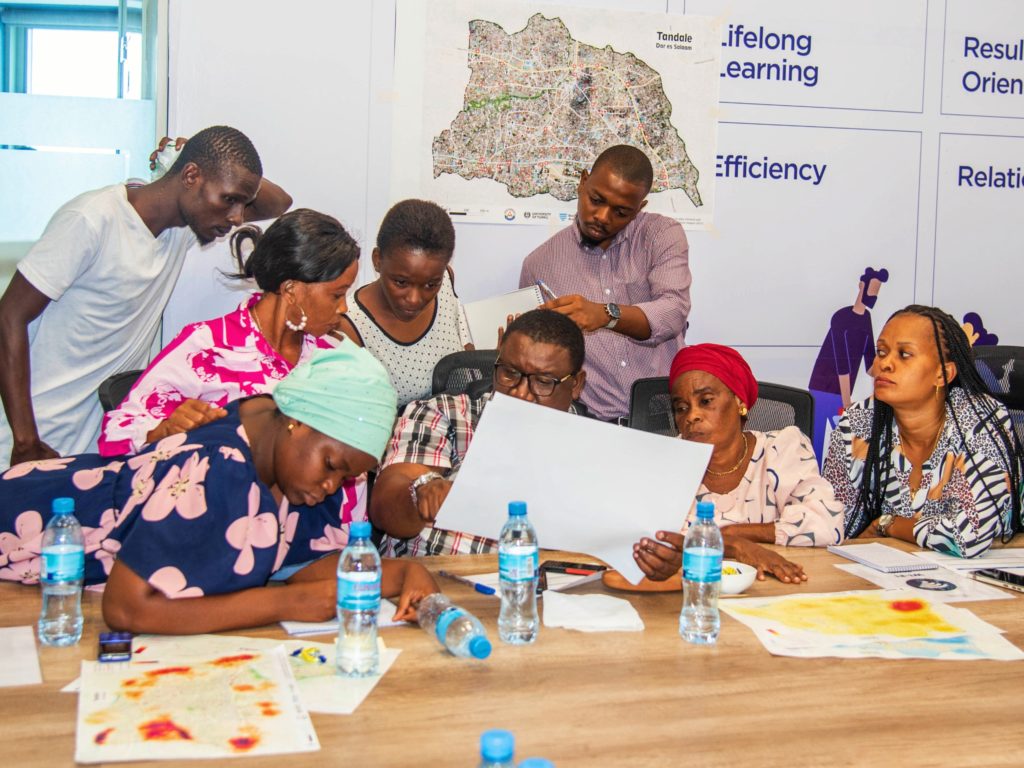
For example, the following questions were discussed:
- What are concrete steps that needs to be taken to meet communities’ needs?
- Who are needed to carry out these steps?
- What data or information must be collected, and what is already existing
- What immediate actions could be taken, and which are more long-term goals?
As another important discussion note, the workshop highlighted challenges in the information flow from the Tanzanian Meteorological Agency to communities regarding climate-related warnings (Figure 4). Discussions centred on improving this flow which currently is time-consuming or behind a paywall. Communities suggest the involvement of local informants who could communicate the situations in neighborhood-level in real time, which aids TMA in down-scaling forecasts, warnings, and climate projections to be more useful to communities in different parts of the city.

Final note from the perspective of execution of the workshop is a shoutout for the ice-breaking exercise that initiated the day. Participants discussed and listed challenges they meet in their daily lives (not only climate-related!) on post-it notes (Figure 5). During breakfast break, the challenges were clustered to thematic groups, and after the break each challenge was discussed and marked whether they are somehow related to climate, urban planning, or both. Almost each challenge mentioned were definitely related to both, and many of the challenges were also heavily interconnected. This initial ice-breaker exercise was aimed to take maximum 20 minutes – just to get conversation flowing – but ended up taking much more time and laid solid ground for the rest of the day. The success of this approach is credited to the KADI WP1 Wits team for their valuable advice, and we can highly recommend similar approach for other stakeholder/actor workshops coming along the KADI project.
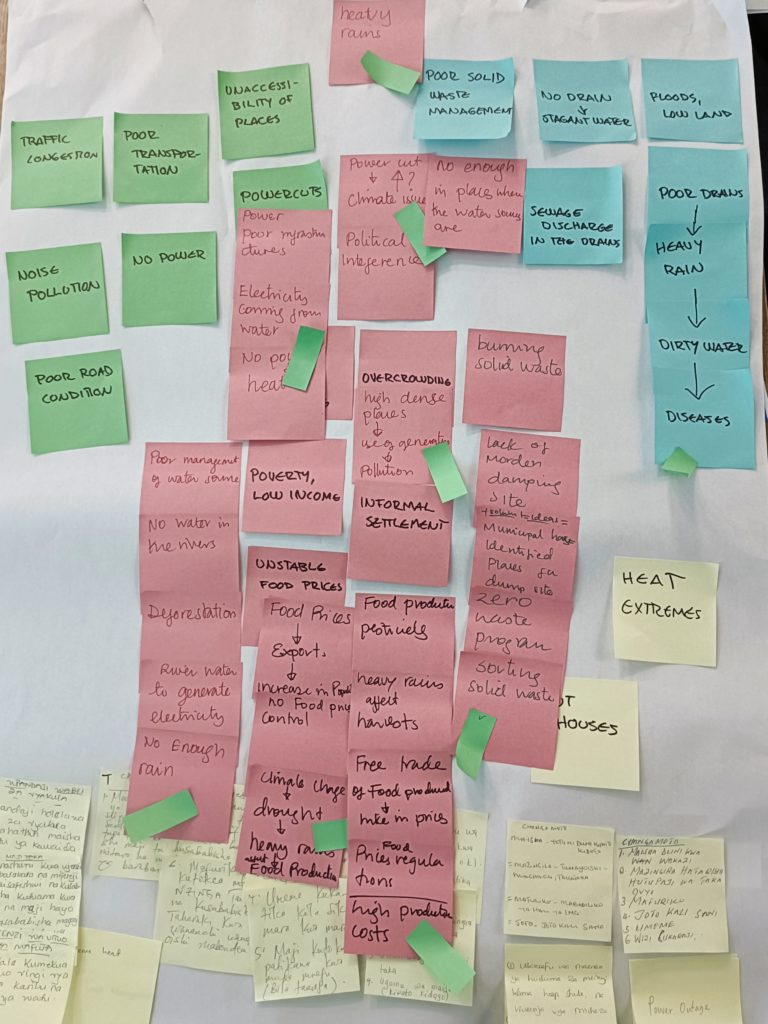
Lessons learned and next steps
Looking back to organising this workshop, there are things we would do differently. We did include three presentation slots to the day to introduce the KADI project, climate service concepts, and the activities we had done prior the workshop. However, kicking off the day, conducting the ice-breaker exercise, having food breaks, and discussing the intended themes took much longer than anticipated. These things were important, and giving them time was purposeful, and thus presenting so many slideshows could have been organised with another approach. Also, not everyone invited to the workshop arrived. This was somewhat managed by inviting two individuals from desired organisations, and at least one representative arrived from each organisation, except from the city’s disaster risk management office, and from an NGO with expertise in community development and participatory mapping.
From now as the KADI Dar es Salaam city pilot progresses, the research team design a climate service concept that incorporates local knowledge to the whole lifecycle of the climate service. The Tanzanian Resilience Academy approach, involving local students in data collection, is a potential avenue, but various community-based methods are also incorporated to the design, such as citizen weather stations (CWS) and participatory online platforms for information sharing.
We want to give a sincere thank you for everyone who have been part of our activities during these last months. The communities’ views on climate and other everyday challenges are often asked, and the most pressing issues in the neighbourhoods are known. However, concrete actions are lacking behind. Climate services are not the sole solution in solving the challenges, but they are an important building block for data-driven and knowledge-based collaborative action by various actors in the local context, and give tools for climate adaptation for the urban communities.
All these activities were carried out by our KADI Dar es Salaam climate service city pilot research team:
Venla Aaltonen
University of Turku
voaaal@utu.fi
Dr. Nelly Babere
Ardhi University
gathiharry@gmail.com
Dr. Lukuba Sweya
Ardhi University
Prof. Niina Käyhkö
University of Turku
Hilary Mvungi
Ardhi University
Msilikale Msilanga
University of Turku


